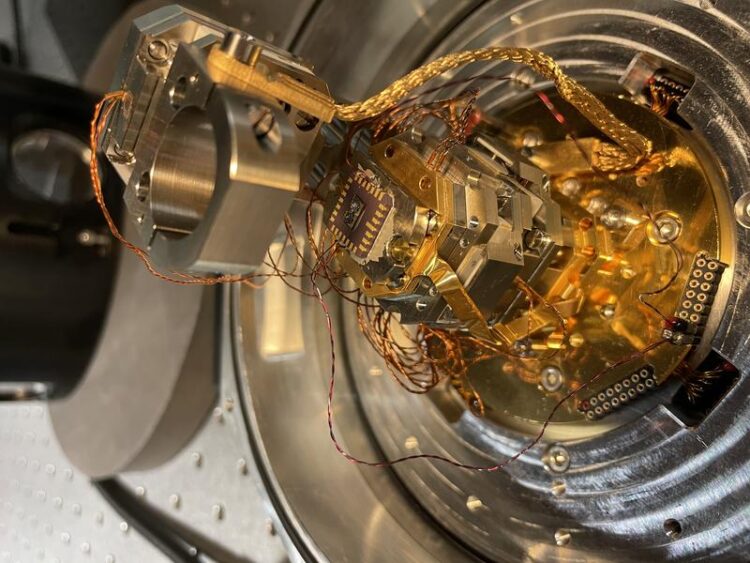Eavesdropping on the electron

A look inside the open cryostat: In operation, the slide with the mounted sample is analyzed in a vacuum at around -270°C.
(c) Hendrik Mannel / UDE/SFB 1242
A method developed at the University of Duisburg-Essen makes it possible to read data from noisy signals: Theoretical physicists and their experimental colleagues have collaborated on this and published their findings in the current issue of the renowned journal “Physical Review Research”. The method they describe could also be significant for quantum computers.
You know it from the car radio: the weaker the signal, the more disturbing the noise. This is even more true for laboratory measurements. Researchers from the Collaborative Research Center 1242 and the Center for Nanointegration (CENIDE) at the University of Duisburg-Essen (UDE) have now described a method for extracting data from noise.
What is a bit in a conventional computer, i.e. state 1 (current on) or state 0 (current off), is taken over in the quantum computer by the quantum bits, or qubits for short. To do this, they need defined and distinguishable states, but they can overlap at the same time and therefore enable many times the computing power of a current computer. This means they could also be used where today’s supercomputers are overtaxed, for example in searching extremely large databases.
In Collaborative Research Center 1242, the smallest structures and their changes are studied, including quantum dots. These nanometer-sized structures can be tailored in their electronic and optical properties in the laboratory. Put simply, their electrons can assume two different directions of rotation (“spin up” and “spin down”). This is how the qubits needed for quantum computers can be realized. These should be stable for as long as possible so that no information is lost. “With our novel technique, we were able to demonstrate that spin states can be specifically prepared and at the same time determine how long such a state is maintained,” explains Dr. Eric Kleinherbers, until recently a postdoc in the Theoretical Physics group headed by Prof. Dr. Jürgen König, now at the University of California, Los Angeles.
For this purpose, a quantum dot sample was permanently exposed to an exciting laser and the resulting noise was recorded over a long period of time. The theoretical physicists around Kleinherbers succeeded in extracting the lifetime of the spin states from this apparently random optical signal. Rolf Landauer, a pioneer of information theory, had already predicted this finding in 1998 and summarized it with the phrase “The noise is the signal!” The technique used now makes it possible to re-evaluate even older, seemingly useless data and to discover signals that had previously remained hidden.
Editor: Peter Kohl, CRC 1242, +49 203/37 9-2822, peter.kohl@uni-due.de
Wissenschaftliche Ansprechpartner:
Eric Kleinherbers, Theoretical Physics, eric.kleinherbers@uni-due.de
Originalpublikation:
https://journals.aps.org/prresearch/abstract/10.1103/PhysRevResearch.5.043103
Media Contact
All latest news from the category: Physics and Astronomy
This area deals with the fundamental laws and building blocks of nature and how they interact, the properties and the behavior of matter, and research into space and time and their structures.
innovations-report provides in-depth reports and articles on subjects such as astrophysics, laser technologies, nuclear, quantum, particle and solid-state physics, nanotechnologies, planetary research and findings (Mars, Venus) and developments related to the Hubble Telescope.
Newest articles

NTU and NUS spin-off cutting-edge quantum control technology
AQSolotl’s quantum controller is designed to be adaptable, scalable and cost-efficient. Quantum technology jointly developed at Nanyang Technological University, Singapore (NTU Singapore) and National University of Singapore (NUS) has now…

How Geothermal Energy Shapes Bavaria’s Green Future Through Sustainable Energy
The Bavarian State Ministry of Science and the Arts has extended its funding for the research association “Geothermal Alliance Bavaria,” with the University of Bayreuth (UBT) continuing as a member…

Spintronics memory innovation: A new perpendicular magnetized film
Long gone are the days where all our data could fit on a two-megabyte floppy disk. In today’s information-based society, the increasing volume of information being handled demands that we…



